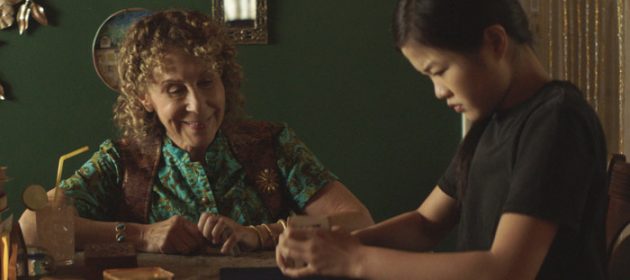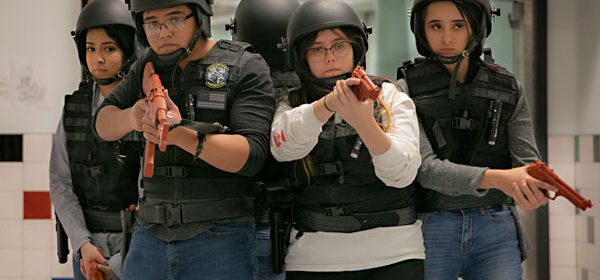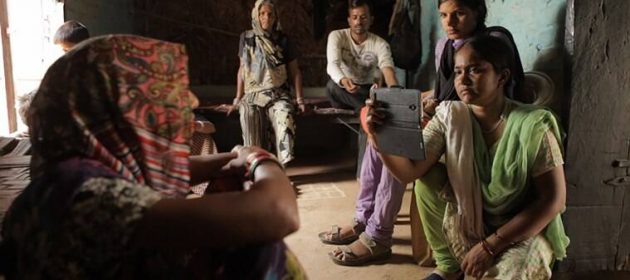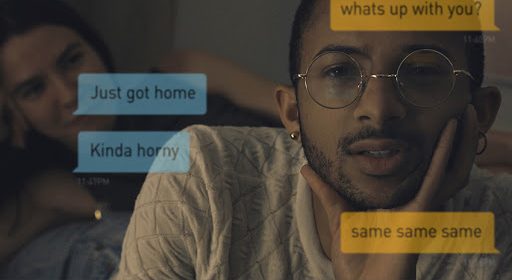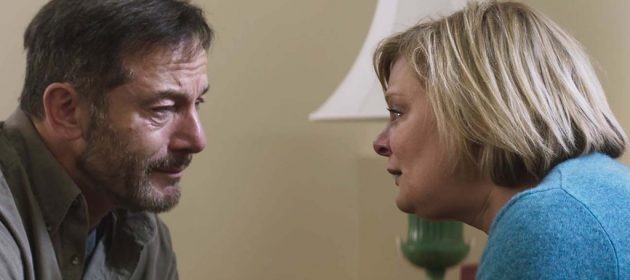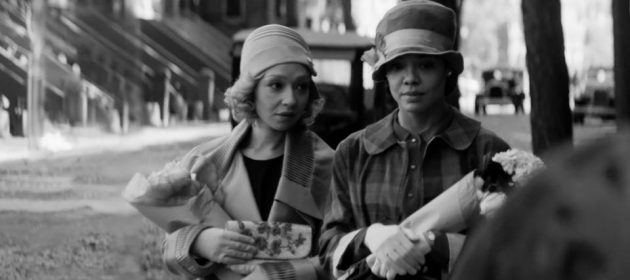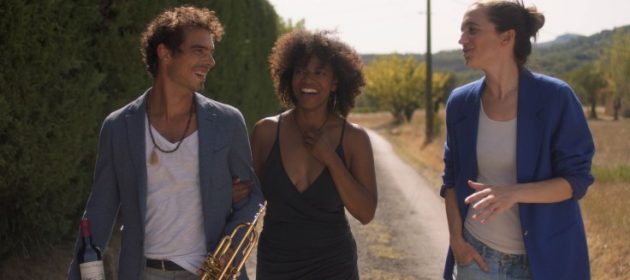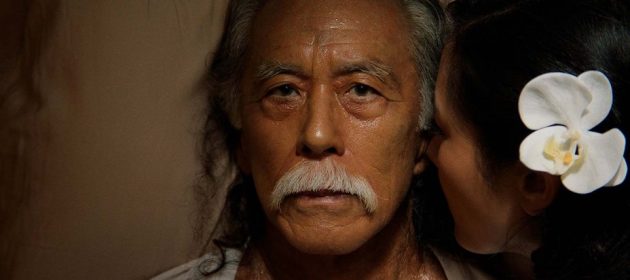sundance
#SUNDANCE: “MARVELOUS AND THE BLACK HOLE”
Review by Amanda Gilmore for Mr. Will Wong
Teenage delinquent Sammy Ko (Miya Cech) is going through a hard time. She’s still mourning the loss of her mother, and her father’s (Leonardo Nam) blooming relationship with Marianne (Pauline Lule) isn’t helping. However, life slowly becomes easier to handle when she has a chance encounter with magician Margot (Rhea Perlman). As Margot teaches Sammy the art of magic a bond develops that nourishes them both.
Marvelous and the Black Hole is a hilarious and heartwarming film. The central storyline involves a young girl dealing with her grief. This could slip into drama territory, but Writer-Director Kate Tsang builds her Script with honest humour that creates a quirky comedy. At the heart of her story is the theme of family. She takes us for a magical ride with two characters who are equally delightful — especially when Sammy is seeping in teenage angst.
Writing a young teen female character like Sammy, who smokes and has a short-fuse, is original on-screen. However, Sammy is an accurate depiction of the inner emotions and outward actions of many teenage girls (specifically those suffering). Tsang has perfectly cast this feisty and charming character with newcomer Cech. At such a young age she delivers each line like a pro, making us laugh and empathize from beginning to end. She has great chemistry with Perlman who is wonderful as Margot.
As the story unfolds, we learn more about Margot and how she’s yearning for her long-lost family, just as Sammy aches for her mother. This is the tie that binds these two kooky characters together, along with the magic; which is exciting to watch, especially when done in one frame with no edits.
Marvelous and the Black Hole screens at Sundance:
Live Screening: January 31 at 12 PM (EST)
On-Demand (available for 24 hours): February 2 at 10 AM (EST)
#SUNDANCE: “TOGETHER TOGETHER”
Review by Amanda Gilmore for Mr. Will Wong
Writer-Director Nikole Beckwith’s second Feature is a beautiful portrait of platonic love during one of life’s most intimate experiences: pregnancy.
Middle-aged App Designer Matt (Ed Helms) wants nothing more than to be a father. There’s only one catch, he’s single. After interviewing gestational surrogates, he chooses 26-year-old Anna (Patti Harrison). Together Together follows them through each trimester, observing how these strangers grow into friends.
Helms is a joy to watch in a departure role in this Indie gem. He’s typically cast in goofball comedies as a stressed-out character. Here we see the range of his comedic and dramatic talents. He gives a heartwarming performance has an eager single father-to-be. Helms is great at showing the simmering anxiety below Matt’s calm exterior. Harrison is wonderful at expressing the emotional barriers Anna has created to protect herself. It’s lovely to watch her slowly take them down and admit to the connection she feels with Matt. They work brilliantly together at showing the platonic love written into Beckwith’s script.
Together Together is a touching film about surrogacy and a rare cinematic examination of platonic relationships.
Together Together screens at Sundance:
Live Premiere: January 31 at 3 PM (EST)
On-Demand (available for 24 hours): February 2 at 10 AM (EST)
#SUNDANCE: “AT THE READY”
Review by Amanda Gilmore for Mr. Will Wong
At The Ready is an enthralling, insightful and all-around excellent Documentary.
It follows students at Horizon High School in El Paso, Texas who are enrolled in law enforcement classes and join the after-school program: Criminal Justice Club. The program puts students in mock-up situations in order to prepare them for a career with the police force, border patrol or DEA. The Documentary primarily focuses on Mexican-American students Mason (known as Kassy in the film), Cesar and recent graduate Cristina, who each strive toward their law enforcement aspirations.
The Documentary is set in 2018-2019, at which time migrants were seeking asylum at the U.S-Mexico border. The teachers of these classes and program ask the students to debate if what the Government was imposing was warranted. In these captivating scenes we witness the students respectfully and clearly voice their differing opinions. It’s inspiring to watch and insightful to listen to.
The Film is focused in these debates and the impact the Government orders have on those working within law enforcement. Director Maisie Crow also includes the Texas Senate Race which saw Ted Cruz beat Beto O’Rourke. All of these clips come together to show that law enforcement takes command from the Government. Yet, it’s the enforcement officers who many blame for carrying out the orders.
Crow directs this powerful Film in a way that makes audiences view enforcement officers as individuals rather than collective units. She humanizes the individuals working in these positions, allowing us to see the person and not the label. Therefore, we question our own opinions of these careers and those working within them. Crow does this while reminding us that there are good and bad people within every profession.
At the heart of the Documentary are the adolescents, primarily Mason, Cesar and Cristina. Each struggle with the Government’s orders, the realities of these jobs, and how they may be at odds with those they love most. It’s their stories that make At The Ready have immense emotional impact that will stay with us for years to come.
At The Ready screens at Sundance:
Live Premiere: January 31 at 12 PM (EST)
On-Demand (available for 24 hours): February 2 at 10 AM (EST)
#SUNDANCE: “WILD INDIAN”
Review by Amanda Gilmore for Mr. Will Wong
Years after covering-up a murder as teenagers, Makwa (Michael Greyeyes) and Ted-O (Chaske Spencer) must face the truth of what they did and who they’ve become.
Wild Indian has a storyline that has been done before, however, Writer-Director Lyle Mitchell Corbine Jr. makes it his own. Through Makwa, Corbine Jr. studies the trauma of familial abuse as a child, while showing the lasting effects into adulthood. Refreshingly, Corbine Jr. doesn’t create characters who are good or evil, they exist in between. Particularly Makwa who has experienced trauma and has committed acts of violence himself.
Greyeyes is commanding as Makwa and helps blurs the lines between the good and bad in his character. He’s at his best when his past threatens to rip away the established life he’s created for himself as an adult. This is where Corbine Jr’s script is also the strongest, seeing the lengths one will go to keep their past hidden and their idealized life intact. Additionally, Spencer gives a compelling performance as the accomplice friend who’s consumed with guilt.
Wild Indian screens at Sundance:
Live Premiere: January 30 at 3 PM (EST)
On-Demand (available for 24 hours): February 1 at 10 AM (EST)
#SUNDANCE: “WRITING WITH FIRE”
By Amanda Gilmore for Mr. Will Wong
This inspiring Documentary follows the ambitious women who work at India’s only all-female news network Khabar Lahariya. We watch as this group of Dalit women switch from print to digital, armed with smartphones and invigorated to correct injustices. Their conviction and passion lead them to question their government, the caste system, patriarchy and more.
Directors Rintu Thomas and Sushmit Ghosh’s decision to focus-in on Chief Reporter, Meera, a few other reporters, makes this Documentary feel intimate. Their concentration reveals the complexity of what the women are attempting to achieve. It’s through these central journalists that audiences learn about the caste system, gendered violence, police corruption, and the notions of power within their community. Writing With Fire is a tremendous accomplishment for these debuting feature directors.
Thomas and Ghosh impressively show the journalists and Khabar Lahariya’s successes and defeats. We witness how some reporting, involving building roads and supplying electricity, led to positive changes. But we also see when their efforts are halted. For instance, their goal to change the notions of power so injustices stop happening can’t be achieved — yet — because of those who currently hold the power. But these awe-inspiring women never give up.
Regardless of how talented this Director duo are, it’s their subjects that make this Documentary a knock-out. When our heroes listen to victims of gender and caste violence, we feel sorrow. When they continue questioning a Minister even though they have been told to leave, we feel proud. When they are in unsafe situations, we fear for them. And when we get an inside look into their struggles of balancing work and home life, we root for them even more.
These Dalit, considered low caste, female journalists work tirelessly at Khabar Lahariya. They began their YouTube Channel in December of 2012. Today they have over 152 million views and 486k subscribers.
Writing With Fire is a fierce reminder that women have the strength to do anything they set their hearts and minds too. Regardless of the ‘powers’ who tell them they can’t. Because they’re the ones who are redefining what it means to be powerful.
Writing With Fire screens at Sundance:
Live Premiere: January 30 at 9 PM (EST)
On-Demand (Available for 24hrs): February 1 at 10AM (EST)
#SUNDANCE: “SEARCHERS”
By Amanda Gilmore for Mr. Will Wong
This Documentary interviews New Yorkers as they navigate online dating during the summer of 2020. Dating is difficult enough, whether using matching-making apps or doing it the old fashioned way. But then the pandemic hit and a need for human connection became even stronger. This is at the heart of Documentarian Pancho Velez’s latest.
Velez places his subjects in front of the lens as they scroll through their preferred apps. This could become dull, however, Velez inventively places the reflection of the apps screen on the lens. This technique creates audience engagement. As we see what and who they’re reacting too, we feel we are ‘searching’ with them. He also transitions between his subjects with footage of lovers around the City. These shots visualize what his subjects are looking for: connection that can make the loneliest of times beautiful.
Refreshingly, these charming subjects are diverse in their ages, races, genders, and sexual preferences. They also come from a multitude of different dating histories. Some have had success in online dating, while others have had negative experiences. Some people are new to dating, while other are divorcees. A variety of dating apps are also highlighted: Grindr, match.com, Bumble, OK Cupid and more. As Velez asks what the subjects are searching for, we see a range of answers from looking for “the one” to simply “the one for right now”.
Even Velez joins in on the online dating world. We watch as he makes a profile and, with the help of his mom, swipes left or right. We wish we could have explored more of his journey and a number of his other subjects. Throughout the many interviews, there does become a trend. They all believe online dating is part of modern times, and particularly part of life in busy New York City. But it’s looked at as a starting point and only when spending time in person can a relationship grow.
Overall, Searchers is a look at one of the loneliest times in modern history, and the need for human connection. Watching as this diverse and delightful group of New Yorkers navigate the pandemic dating world reminds us of our universal want: love.
Searchers screens at Sundance:
Live Premiere: January 30 at 9 PM (EST) On-Demand (Available for 24hrs): February 1 at 10AM (EST
#SUNDANCE: “MASS”
Review by Amanda Gilmore for Mr. Will Wong
Years after a mass shooting at a high school, two sets of parents —Richard (Reed Birney), Linda (Ann Dowd), Jay (Jason Isaacs), and Gail (Martha Plimpton) — meet to discuss the tragedy. The interaction is going to be tense. Jay and Gail’s son was killed in the mass shooting by Richard and Linda’s son.
Writer-Director Fran Krantz’s debut Feature is a heartbreaking look at the aftermath of tragedy. He examines guilt, resentment and the power of forgiveness. Although Mass is set primarily in one room and has heavy dialogue throughout, it never gets boring thanks to the powerhouse Ensemble he’s assembled.
Birney is mysterious as Richard, who often denies the role mental health played in his son’s actions. He shines in a scene where he explains that parents always see the best in their children. Dowd proves, once again, why she is one of the greatest working actresses today. She gets to the heart of being a mother: her unrelenting love for her son and guilt for not seeing what he was capable of doing. Isaacs is phenomenal as the grief-ridden, yet controlled Jay. He’s particularly poignant in a scene where Jay’s emotions get the better of him. And Plimpton is a force as Gail, who will do anything to hold onto her anger because she believes it’s the only way to hold on to her son.
From the moment they’re all in the room together, a feeling of discomfort sets-in. We are introduced first to Jay and Gail, whom visibly are consumed by their grief and anger. This is a contrast to Richard and Linda, whom appear to be racked with guilt. As time progresses, the dialogue becomes increasingly truthful, exposing their humanity within. It’s when they become honest that we learn about the healing power of communication. In a world where everyone wants to talk and no one wants to listen, Krantz places us in a room with no escape and makes us listen. In doing so, he shows us how open conversation and active listening can lead to catharsis and healing.
At the start of their interaction, it feels as though the conversation has been rehearsed. They’ve had years of imagining this moment. In these scenes, Krantz holds a steady camera and makes clean cuts between his characters. Eventually, the ugliness rears its head. This is when Krantz switches to a shaky hand-held camera with quick, choppy edits between close-ups of his characters. This dramatic change punctuates his characters’ inner emotions.
Overall, Mass is an emotionally hard-hitting Film filled with four riveting performances that will leave you shaken.
Mass screens at Sundance:
Live Premiere: January 30 at 3 PM (EST)
On-Demand (available for 24 hours): February 1 at 10 AM (EST)
#SUNDANCE: “PASSING”
Review by Amanda Gilmore for Mr. Will Wong
Irene (Tessa Thompson) is an upper-class 1920s woman who lives in Harlem with her husband, Brian (André Holland), and their two sons. One day, while out at the Grand Tearoom in New York City’s Drayton Hotel, she runs into an old high school acquaintance, Clare (Ruth Negga). She finds out that Clare has been passing as white. Her ability to pass is proven as Irene learns she’s married to a white man (Alexander Skarsgård) and have children of their own. However, when Clare decides to ignite a friendship with Irene, both their lives become threatened.
Nella Larsen’s ground-breaking Novella is brought eloquently to the screen by Rebecca Hall. She unpacks central themes of race, identity, community, repression and constructed realities all while making her Feature directorial debut a technical marvel. She shoots this quiet, Psychological Drama with the filmmaking aesthetics of the time in which the story is set. Passing is shot in Black and White, has a 4:3 Aspect Ratio, and the music mimics an era past.
Her decision to shoot in Black and White strips all colour out of this film about race. What’s left is a beautiful composition of gray frames that perfectly reflect the gray-areas of race the Film explores. Hall’s cinematographic decisions go further in her choice of Aspect Ratio. Not only does a 4:3 image create a nostalgic look of old Hollywood glamour, it also forces us to really look at the faces of the characters. This is an integral part of Passing because Thompson and Negga’s impactful performances become the focus, with scenes framed tightly around their faces. This aids in helping us see Irene and Clare’s hidden desires and restrained longing.
Furthermore, the Sound Design thrusts us into the inner turmoil these characters are facing. In addition to taking us back to 1929, the Film’s Costume Design by Marci Rodgers, help us visualize the stark contrasts between both women. Irene is constrained, she wears modest clothing and a hat that covers much of her face. While Clare is beguiling, she wears outfits that swing as she walks and a hat that’s lifted-up showing herself completely. This is compelling because Clare is the one who’s passing, yet Irene appears to be hiding.
These two characters were captivating and nuanced when Larsen wrote them in the ’20s. Thankfully, Hall has kept them richly complex, enabling Thompson and Negga to be mesmerizing in their roles. It’s rare, even today, for female friendships to be examined in Film with such intricacy. Yet, this is what’s at the heart of Passing. The two women are each missing something the other has. Passing analyzes how you can equally admire and envy a friend for something you are missing. This is a story about the duality of human beings, expressed articulately through its two leads.
Thompson gives an unbelievably expressive performance as the quiet Irene, and Negga is a magnetic presence as Clare. She shows the life Irene has conformed to and her desire to break-free of those boxes. This is where cunning Clare fills the voids in Irene. Clare longs finally to be with her community again. And this is where Irene fills the voids in Clare. Thompson and Negga have a strong, layered chemistry. The Film plays with the ambiguity of the feelings between these women. It appears that there’s something simmering beneath the surface of this friendship, but it isn’t quite known exactly what. Additionally, these Actors nail one of the most integral parts of telling a story that takes place in 1929, the diction and way of speaking. No detail is spared.
Passing is a quiet film that manages to say so much. It has a Psychological Thriller that becomes more apparent as time progresses. Hall crafts something that’s rich in technicality and highlighted by its superb performances. Its intricate Screenplay is brought to life by a Director who has a clear vision and knows how perfectly to execute it. A remarkable debut as Director by Hall.
Passing screens at Sundance:
Live Premiere: January 30 at 6 PM (EST)
On-Demand (available for 24 hours): February 1 at 10 AM (EST)
#SUNDANCE: “MA BELLE, MY BEAUTY”
By Amanda Gilmore for Mr. Will Wong
Newlywed musicians Bertie (Idella Johnson) and Fred (Lucien Guignard) are adjusting to their new life in the countryside of France. This new lifestyle is easy for Fred but Bertie is grappling with depression that’s affecting her singing. However, a change begins happening with Bertie when their former shared lover Lane (Hannah Pepper), surprisingly shows up for a visit.
Director-Screenwriter Marion Hill takes audiences through the desires of three individuals once involved in a polyamorous relationship. Thankfully, Hill doesn’t take a judging eye to the characters’ relationship. She focuses on their wants as individuals, rather than viewing them as interconnected. This gives us a look at the complexities of love along with sexual fluidity and triangulation. In doing so, Hill has created identifiable characters which have been cast expertly.
Johnson is a captivating force as Bertie. She shows Bertie’s tough exterior while exposing the vulnerability she has around Lane. During a breakfast scene, we witness Johnson change between being annoyed, angry, and sad. She then composes herself to hide Bertie’s pain. Pepper gives a great performance as the caring Lane. She keeps mystery within her character until the end. Making audiences question why Lane came back after disappearing on Bertie and Fred years ago, and what exactly she wants. Johnson and Pepper have a powerful chemistry that creates an anticipation in every scene. Their strongest moment together is when they finally have a dinner alone. Bertie feels she can’t open up to Lane, or Fred, and Lane tries to explain how Bertie has two people who love her.
When it comes to intimacy, we often consider it a physical act. However, Hill creates intimacy with words. The intimacy is through small, quiet moments where her characters are being honest with each other. Hill also takes the audience on a journey through a sun soaked summer in the south of France; with beautiful shots of vineyards, candlelit dinners, and farmer’s markets. These picturesque shots are highlighted with an intoxicating Soundtrack of acoustic guitar and jazz music by Mahmoud Chouki. It all comes together to work as a love letter to the region and complements the inner lives of the characters.
Ma Belle, My Beauty screens at Sundance:
Live Premiere: January 30 at 6 PM (EST)
On-Demand (available for 24hrs): February 1 at 10 AM (EST)
#SUNDANCE: “I WAS A SIMPLE MAN”
Review by Amanda Gilmore for Mr. Will Wong
I Was A Simple Man is set on the North Shore of Oahu, Hawai’i. It follows Masao (Steve Iwamoto) and his family through three different time periods. From the pre-World War II sugar plantations of Oahu to Hawai’i statehood, to the present gentrification of Honolulu. In the present, Masao is facing his imminent death and is visited by ghosts of his past, including his wife Grace (Constance Wu).
Writer-Director Christopher Makoto Yogi’s second Feature is a quiet study of a man’s life. He uses surrealistic editing to bring audiences on a journey through Masao’s past and present. This helps differentiate the political, social and personal impacts Masao faced. In doing so, we witness an expansive look into one man’s journey through life.
Yogi has a show, don’t tell quality in his filmmaking. Rather than explain the progressions in Masao’s illness, he uses the natural landscape of Hawai’i. Before he finds out about his fatal illness, his garden flourishes. As his health deteriorates, the plants in his garden become decayed and some fruit rotted. Yogi uses the beauty of his setting to enhance Masao’s story to visualize the spiritual connection one has with their environment.
Additionally, I Was A Simple Man is a study on the emotional impacts death and loss have on families. In the past, Masao deals with his grief in a way he only knows how. In the process, he created a barrier between him and his children. In the present, his undying love for his wife and Grace’s love for him collide within his dying process. She aids him in his passage over, as his living family (daughter and grandson) come to care for him the best they can.
With minimal amounts of dialogue throughout, the cast uses restraint and movement to express their characters’ emotions. Iwamoto is captivating as a man who seems content in his diagnosis and imminent death. Tending to his plants until he is bedridden, and even then, he is in a state of calm. Wu is a powerful presence as the ghost of Grace. There’s a scene where her daughter can’t see her, and Wu tenses every muscle in her body and reaches for her in hope.
I Was A Simple Man screens at Sundance:
Live Premiere: January 29 at 3 PM (EST)
On-Demand (available for 24 hours): January 31 at 10 AM (EST)
For advertising opportunites please contact mrwill@mrwillwong.com




